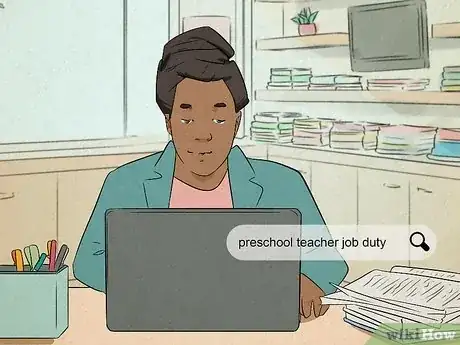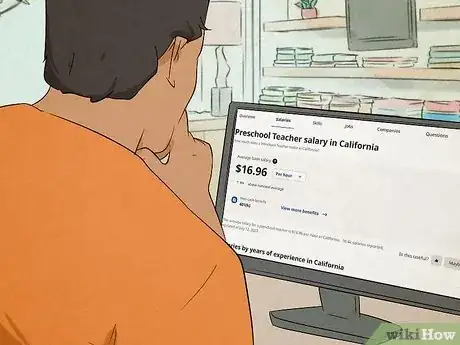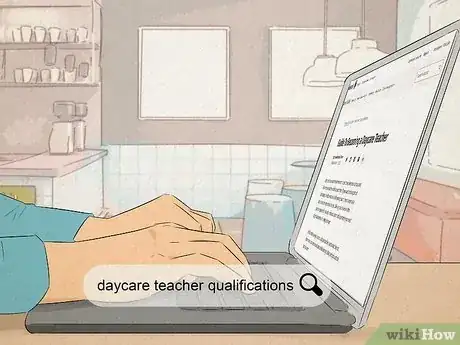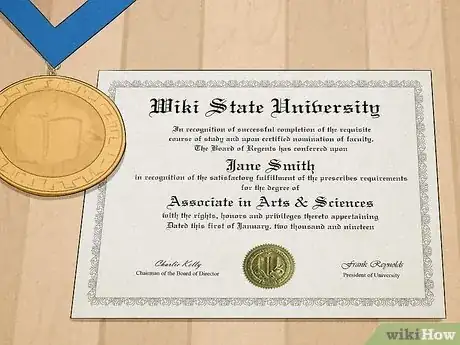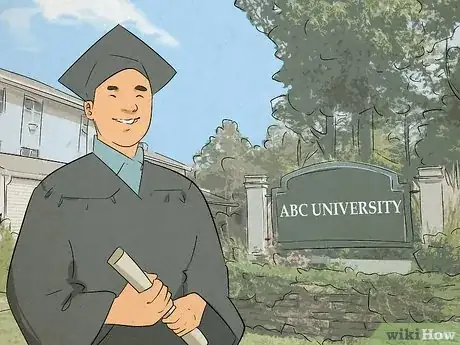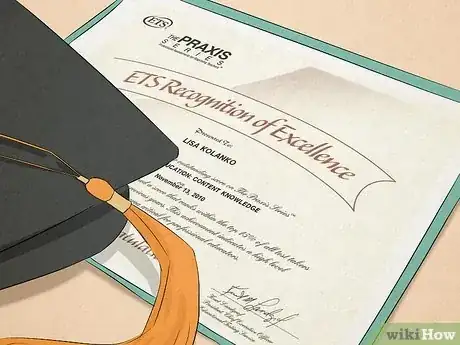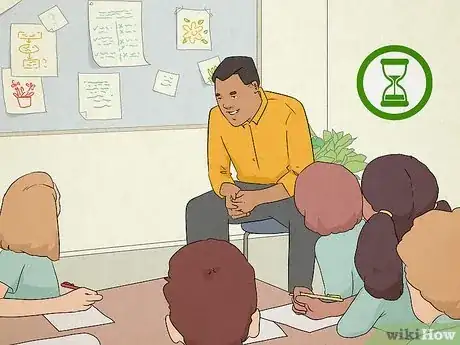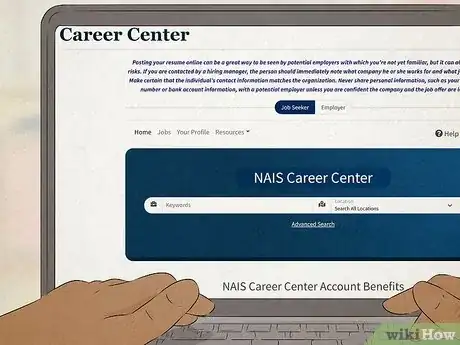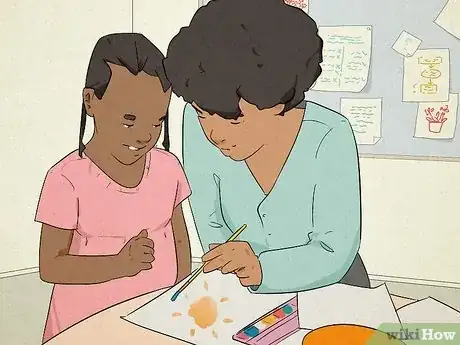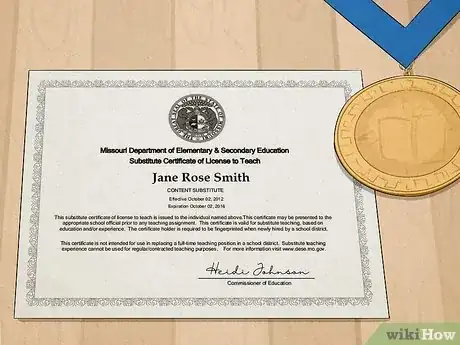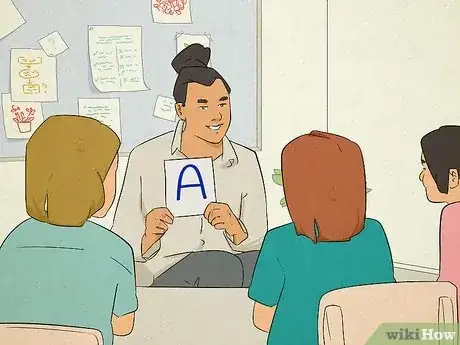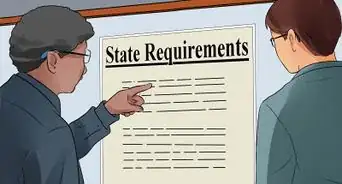This article was co-authored by Bianca Solorzano, M.Ed.. Bianca Solorzano is an Infant Development Specialist, Montessori Consultant, and the Founder of Baby Tour Guide Inc. Through her company, she helps parents, educators, and caregivers optimize baby and toddler development using a Montessori Lens. She does so by providing one-on-one consulting, running her blog, and hosting the Montessori Babies Podcast. With more than 11 years of experience in child development, she specializes in supporting parents in approaches such as purposeful language, environment setup, toys/activities that aid in development, positive redirection and behavior, and directed choice. Bianca holds a BS in Child and Adolescent Development with a focus in Early Childhood Education from California State University, Fullerton, a Masters in Montessori Education from Loyola University Maryland, and the AMI International Montessori Certification from The Montessori Institute of San Diego for children Birth-3 Years. Bianca is also a member of the National Association for the Education of Young Children (NAEYC).
There are 15 references cited in this article, which can be found at the bottom of the page.
wikiHow marks an article as reader-approved once it receives enough positive feedback. In this case, several readers have written to tell us that this article was helpful to them, earning it our reader-approved status.
This article has been viewed 125,491 times.
To the uninitiated, nursery school teaching involves simply playing all day. Nothing could be further from the truth! It is a demanding, often underappreciated profession that can have a tremendous impact on young children’s development. While it can be immensely rewarding for those with the passion, patience, and perseverance to work with the youngest students, it is not for everybody. Find out if you have what it takes for this career path and how to pursue it.
Steps
Understanding the Basics
-
1Research what preschool teachers do. Many people who want to become preschool teachers do so because they love working with children, but it is a very intense and grueling profession, often involving long hours crafting lesson plans or writing student evaluations. However, it is also an invaluable profession that helps the youngest students become lifelong learners. The following are among the content and skills you’ll be responsible for guiding students through:[1]
- Learning to recognize letters and sounds
- Learning numbers and counting
- Learning the basics of writing
- Learning to follow directions, voice their needs, and socialize
-
2Consider your own strengths and weaknesses. Preschool teaching is not for everyone, especially given the long hours and relatively low pay. In addition to a passion for working with children, you should have the following characteristics:[2]
- Ability to communicate with different kinds of people. Communicating with a four-year-old requires different skills from communicating with her parent or presenting to colleagues and administrators.
- Creativity and adaptability. Not only must you be able to develop engaging lesson plans, but you must also be able to adapt these lesson plans. Different students will have very different needs.
- Organization. You will need to make careful notes about your lesson plans (what you did, what worked and what didn’t, what you would change in the future). While preschool teachers generally do not give their students formal grades, you will also need to keep track of your students’ work so that you can write regular progress reports.
- Patience. A room full of preschoolers can’t help but be frustrating at times, but you cannot become overwhelmed by this inevitability. Can you maintain your calm at all times?
- Energy. Preschoolers are also physically exhausting. Do you have the stamina to interact with them for seven or eight (or more) hours a day, most of it standing, and then spend several hours writing lesson plans afterwards?
Advertisement -
3Consider job prospects and pay. While the Bureau of Labor Statistics projects that preschool teaching will continue to grow over the next several years, meaning that there will be more jobs, these jobs will continue to pay modestly.[3]
- The number of children between three and five is expected to grow over the next several years. Many of them will be enrolled in preschool.
- You will have a much easier time finding a job if you have some education past high school, especially if you have a bachelor’s degree.
- However, even those with bachelor’s degrees will likely make less money than people in other closely-related professions.
- Keep these factors in mind when it comes to pursuing different qualifications.
Becoming Qualified
-
1Research the qualifications for different institutions.[7] These range from a high school diploma to a bachelor’s degree.[8]
- Childcare centers require that you have a high school diploma and a special certification for working with young children.[9] The most common certification is the National Early Childhood Program Accreditation.[10]
- Head Start programs (founded to serve low-income children) require you to have an associate’s degree, although half of their teachers must have bachelor’s degrees.[11]
- Public schools generally require you to have a bachelor’s degree.
-
2Get experience. In some states, you are legally required to have experience working with young children to be hired as a preschool teacher. Even if it is not required, prospective employers will certainly look for it. Experience could be in a daycare, summer camp, after-school program, or as a teacher’s aide.[12]
-
3Get an associate’s degree.[13] At two years, an associate’s degree can put you on the path to your desired profession faster and less expensively than a bachelor’s degree. Community colleges in your area will frequently offer associate’s degrees in early childhood education and related fields.
- You will take courses in subjects including educational principles, child development, administration and management, and language arts instruction for young students.
- You will also complete some student teaching.
-
4Pursue a four-year degree. A bachelor’s degree in early childhood education or a related field will combine coursework in core social sciences and humanities subjects with both courses and extensive fieldwork (observation and student teaching) in education. These programs will also prepare you to become certified in your state.
-
5Become certified in your state.[14] Most states will require you to pass additional tests before you can become certified to teach in public schools. In some states you will take a test called the PRAXIS, while others develop their own testing materials. Online guides have also compiled directories of each state’s requirements, though much of the content will not vary.[15]
- The Education of Young Children PRAXIS will test your knowledge of subjects including child development; appropriate observation and assessment techniques; professional behavior, communication, and development; level-appropriate content; and pedagogical strategies.[16]
- State exams may be structured differently, but they will test much of the same knowledge, including your understanding of both the subject matter and how to teach it and your ability to interact with children and families from diverse backgrounds.[17]
- Once you have completed testing, complete your state’s certification application (go to your state’s Department of Education or visit its website), and gather some or all of the following: transcripts, test scores, previous teaching certifications, recommendations, and background check results. Mail the application and required documents to the address specified on the application.[18]
Finding a Job
-
1Know that it might take some time. Although preschool teaching is a growing field, people are also waiting longer to retire, and state and federal funding for education is an often-contested field. You might not find your dream job at first, but there are steps you can take to increase the likelihood of long-term success.
-
2
-
3Cast a wide net. While you become certified in a specific state, many states have reciprocity with one another. For instance, if you are certified in Pennsylvania, you will be able to teach in public schools in Delaware and other neighboring states. It might make for a longer drive, but in many cases it is doable.
-
4Prepare for interviews. While every school is different, employers will be looking for many of the same qualities in potential hires. You'll be doing yourself a disservice if you go into your interviews blind. Instead, be prepared so that you will meet--or even exceed--your interviewers' expectations.[21]
- Practice answering tough questions. Being able to speak extemporaneously is important, but that doesn't mean you should avoid practicing answers to difficult questions. Be ready to discuss the following:
- Why you decided to become a preschool teacher
- Addressing different styles of learners
- Your pedagogical approach and the theories underpinning it
- Communicating with parents
- Assessing student progress
- The specific school or school district where you are interviewing
- Bring the right materials. You've already sent them your resume, letters of recommendation, and perhaps a portfolio, but interviewers will be impressed if you bring copies of these materials on interview day, as well. Don't overwhelm them with content--just bring enough to appear organized and professional.
- Be prepared to do a teaching demonstration. You may be asked to conduct a sample lesson in front of administrators and current teachers. This is usually not something that happens at a first interview. Teaching demonstrations are time-consuming, so schools will generally only invite finalists to do so.
- Practice answering tough questions. Being able to speak extemporaneously is important, but that doesn't mean you should avoid practicing answers to difficult questions. Be ready to discuss the following:
-
5Be persistent and patient. The turnover rate among preschool teachers can be high, so schools are sometimes left scrambling for a qualified candidate just days before the school year begins. Just because you did not get a specific job that you applied for in April, you are not necessarily out of luck come August. If possible, you should submit applications even to schools without advertised openings just in case such a situation occurs.
-
6Consider different settings. Part of this will depend on the qualifications you have, but some of it will also be preference and job availability. Believe it or not, only 16% of preschool teachers work in public or private elementary or secondary schools. The rest are employed in daycares (54%), religious and other independent centers (21%), and individual arrangements (3%).[22]
- Teachers in schools will generally teach during the school year, although they may also work in camps or elsewhere during the summer.
- Teachers in daycares and other centers will generally teach all year long, and they may be with children for more hours of the day.
-
7Sign up for substitute teaching. Requirements vary greatly for substitute teaching, and they can differ even on a district-by-district basis. While some locales require that you be a certified teacher, others ask only for a high school diploma. Substitute teaching can be a great way of gaining experience and getting your foot in the door.[23]
- You’ll need to contact the school district (or specific school, if you are interested in substituting in a private school where requirements may be less strict) to determine if you are qualified.
- Be prepared to provide the school/school district with any transcripts and the results of a background check.
-
8Don’t rule out starting as an Assistant Teacher or teacher’s aid. Since preschool children require so much attention, many schools hire other adults to perform various instructional, organizational, and preparatory tasks. Like substitute teaching, this is both great experience and a way to make yourself a known quantity in the school.[24]
- Some states have special programs where you can become an Assistant Teacher after completing two years of a bachelor’s degree program.
- This way, when you graduate you will have a degree, a certification, and lots of experience—a good combination for being on the job market.
Expert Q&A
-
QuestionWhat qualifications do you need to be a nursery teacher?
 Bianca Solorzano, M.Ed.Bianca Solorzano is an Infant Development Specialist, Montessori Consultant, and the Founder of Baby Tour Guide Inc. Through her company, she helps parents, educators, and caregivers optimize baby and toddler development using a Montessori Lens. She does so by providing one-on-one consulting, running her blog, and hosting the Montessori Babies Podcast. With more than 11 years of experience in child development, she specializes in supporting parents in approaches such as purposeful language, environment setup, toys/activities that aid in development, positive redirection and behavior, and directed choice. Bianca holds a BS in Child and Adolescent Development with a focus in Early Childhood Education from California State University, Fullerton, a Masters in Montessori Education from Loyola University Maryland, and the AMI International Montessori Certification from The Montessori Institute of San Diego for children Birth-3 Years. Bianca is also a member of the National Association for the Education of Young Children (NAEYC).
Bianca Solorzano, M.Ed.Bianca Solorzano is an Infant Development Specialist, Montessori Consultant, and the Founder of Baby Tour Guide Inc. Through her company, she helps parents, educators, and caregivers optimize baby and toddler development using a Montessori Lens. She does so by providing one-on-one consulting, running her blog, and hosting the Montessori Babies Podcast. With more than 11 years of experience in child development, she specializes in supporting parents in approaches such as purposeful language, environment setup, toys/activities that aid in development, positive redirection and behavior, and directed choice. Bianca holds a BS in Child and Adolescent Development with a focus in Early Childhood Education from California State University, Fullerton, a Masters in Montessori Education from Loyola University Maryland, and the AMI International Montessori Certification from The Montessori Institute of San Diego for children Birth-3 Years. Bianca is also a member of the National Association for the Education of Young Children (NAEYC).
Infant Development & Montessori Consultant Well, the primary qualification to become a nursery or preschool teacher varies from state to state and country to country. In the United States, it is common to require a high school diploma, as well as an associates degree in Child Development.
Well, the primary qualification to become a nursery or preschool teacher varies from state to state and country to country. In the United States, it is common to require a high school diploma, as well as an associates degree in Child Development. -
QuestionHow do I become a nursery teacher in California?
 Bianca Solorzano, M.Ed.Bianca Solorzano is an Infant Development Specialist, Montessori Consultant, and the Founder of Baby Tour Guide Inc. Through her company, she helps parents, educators, and caregivers optimize baby and toddler development using a Montessori Lens. She does so by providing one-on-one consulting, running her blog, and hosting the Montessori Babies Podcast. With more than 11 years of experience in child development, she specializes in supporting parents in approaches such as purposeful language, environment setup, toys/activities that aid in development, positive redirection and behavior, and directed choice. Bianca holds a BS in Child and Adolescent Development with a focus in Early Childhood Education from California State University, Fullerton, a Masters in Montessori Education from Loyola University Maryland, and the AMI International Montessori Certification from The Montessori Institute of San Diego for children Birth-3 Years. Bianca is also a member of the National Association for the Education of Young Children (NAEYC).
Bianca Solorzano, M.Ed.Bianca Solorzano is an Infant Development Specialist, Montessori Consultant, and the Founder of Baby Tour Guide Inc. Through her company, she helps parents, educators, and caregivers optimize baby and toddler development using a Montessori Lens. She does so by providing one-on-one consulting, running her blog, and hosting the Montessori Babies Podcast. With more than 11 years of experience in child development, she specializes in supporting parents in approaches such as purposeful language, environment setup, toys/activities that aid in development, positive redirection and behavior, and directed choice. Bianca holds a BS in Child and Adolescent Development with a focus in Early Childhood Education from California State University, Fullerton, a Masters in Montessori Education from Loyola University Maryland, and the AMI International Montessori Certification from The Montessori Institute of San Diego for children Birth-3 Years. Bianca is also a member of the National Association for the Education of Young Children (NAEYC).
Infant Development & Montessori Consultant California and some other states only require an Early Childhood Teaching Certificate, so you would need the 4 common core Child Development Classes to earn your certification.
California and some other states only require an Early Childhood Teaching Certificate, so you would need the 4 common core Child Development Classes to earn your certification. -
QuestionWhat is the salary of a nursery teacher in India?
 Community AnswerIt depends on the institution you're working for and how long have you been a part of it/ how much experience you have.
Community AnswerIt depends on the institution you're working for and how long have you been a part of it/ how much experience you have.
References
- ↑ http://www.preschoolteacher.org/what-is-early-childhood-education/
- ↑ http://www.bls.gov/ooh/education-training-and-library/preschool-teachers.htm#tab-4
- ↑ http://www.bls.gov/ooh/education-training-and-library/preschool-teachers.htm#tab-6
- ↑ http://www.bls.gov/ooh/education-training-and-library/preschool-teachers.htm#tab-5
- ↑ http://www.bls.gov/ooh/education-training-and-library/preschool-teachers.htm#tab-7
- ↑ http://www.bls.gov/ooh/education-training-and-library/preschool-teachers.htm#tab-5
- ↑ Bianca Solorzano, M.Ed.. Infant Development & Montessori Consultant. Expert Interview. 1 November 2021.
- ↑ http://www.bls.gov/ooh/education-training-and-library/preschool-teachers.htm#tab-4
- ↑ Bianca Solorzano, M.Ed.. Infant Development & Montessori Consultant. Expert Interview. 1 November 2021.
- ↑ http://www.bls.gov/ooh/education-training-and-library/preschool-teachers.htm#tab-4
- ↑ http://www.bls.gov/ooh/education-training-and-library/preschool-teachers.htm#tab-4
- ↑ http://www.bls.gov/ooh/education-training-and-library/preschool-teachers.htm#tab-4
- ↑ Bianca Solorzano, M.Ed.. Infant Development & Montessori Consultant. Expert Interview. 1 November 2021.
- ↑ Bianca Solorzano, M.Ed.. Infant Development & Montessori Consultant. Expert Interview. 1 November 2021.
- ↑ http://www.preschoolteacher.org/careers/
- ↑ https://www.ets.org/s/praxis/pdf/5024.pdf
- ↑ http://www.preschoolteacher.org/new-york/#pass-examinations
- ↑ http://www.preschoolteacher.org/new-york/#pass-examinations
- ↑ http://jobs.joindelawareschools.org/
- ↑ http://careers.nais.org/jobseekers/
- ↑ http://www.scholastic.com/teachers/article/principals-share-their-secrets-how-impress-interview
- ↑ http://www.bls.gov/ooh/education-training-and-library/preschool-teachers.htm#tab-3
- ↑ http://www.teaching-certification.com/teaching/delaware-substitute-license.html
- ↑ http://www.preschoolteacher.org/pennsylvania/
About This Article
If you’d like to become a nursery teacher, make sure that you have the patience and energy to deal with a room full of preschoolers. You’ll also need to spend long hours on lesson plans and student evaluations, and be able to work effectively with other teachers, parents, and administrators. In order to start teaching, you’ll need to receive a certification, like the National Early Childhood Program Accreditation. You may also need to be certified in your state by taking an exam like the Education of Young Children PRAXIS test. To learn more, including how to find your first job as a preschool teacher, scroll down!
